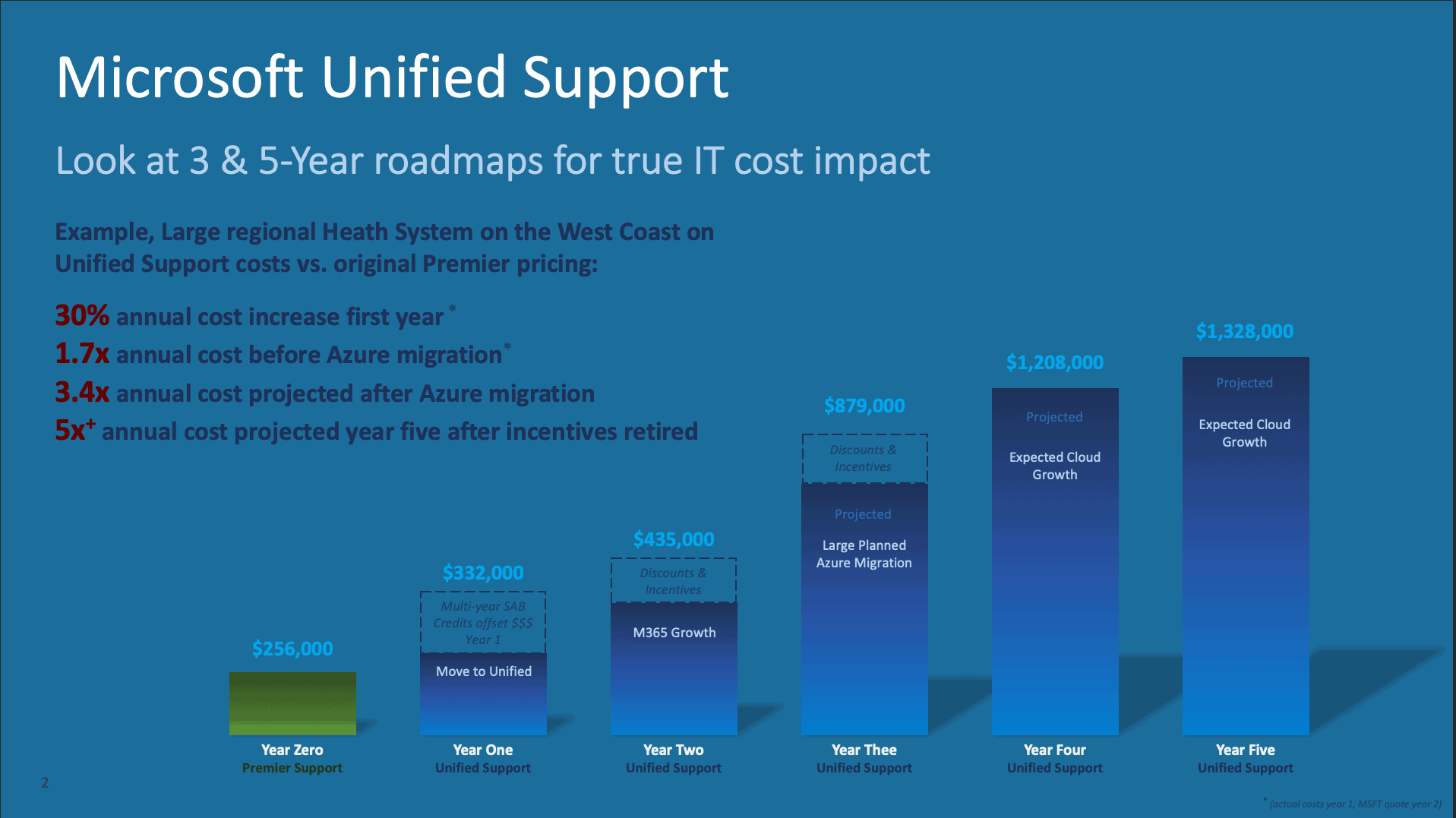

Top 4 Risks of Renewing Microsoft Unified Support in 2023.
Top 4 Risks of Renewing MS Unified Support
Enterprises must acknowledge the 4 risks of MS Unified Support and either renew (and pay more), or mitigate with a viable third-party Microsoft support provider in 2023.
Initiatives: Negotiating Microsoft Contracts | Strategic IT Cost Optimization
Audience: CIO and IT Executives | Sourcing, Procurement and Vendor Management

#1 PRICING PREDICTABILITY
Who is impacted: Chief Technology Officer (CTO)
Pricing Predictability of Microsoft Unified Support is a risk to enterprise technology budgets. CTOs must be able to accurately forecast Microsoft cloud consumption while avoiding significant future Unified cost increases.
Unified Support’s unlimited Microsoft product support initially looks attractive but often results in significant cost increases for enterprises over time. Unified Support is forecasted to cost 2-5x more than Premier over the next 5 years and a 6-8 % increase in most Enterprise Agreements (EA) at renewal.

Pricing Predictability Risk Mitigation
At least 3 months prior to your Unified renewal in 2023, CTOs should conduct an audit on the renewal proposal in order to fully understand how the price is calculated. Your audit rights allow you to see and fully understand the look-back over a 3-5 year timespan.
Ask for the information as spreadsheet, not a PDF. The information should include: contract number and type (Enterprise Agreement, MPSA, etc…) and a detailed list of every product in the contract, annual cost, and type.
Once you have a handle on what Microsoft products and services you need and that drive your Unified Support cost, put them in a spreadsheet and apply anticipated growth across the various products for 5 years into the future.
In addition, remember to remove SAB credits and SA discounts from forecasts since they are being retired by Microsoft as of February 1, 2023. This analysis will allow you to arrive at an effective Unified Support cost forecast for your enterprise.
#2 QUALITY DEGRADATION
Who is impacted: Chief Information Officer (CIO)
Service Delivery – As more Unified clients take advantage of opening tickets “as needed” across their entire organization (the Unified mantra), Microsoft service delivery is struggling to keep up. Even with a good portion of Unified Support outsourced overseas and requiring CSPs to handle level 1 and 2 support for their customers, the Microsoft support experience continues to deteriorate in 2023.
CSAM – Customer Success Account Managers are the new primary customer facing role responsible for customer success through the management of program deliveries and strong customer relationships. The prevailing business priority is the customer’s successful adoption and productive use of Microsoft cloud technologies. CSAMs have replaced TAMs in the new Unified Support model and typically have about half the experience of a TAM.
TAM – Technical Account Managers plan, manage and review the delivery of support services that drive outcomes aligned to a client’s IT and business goals. The TAM is also an escalation point, ensuring the client receives a world class support experience. TAMs are no longer available from Microsoft but are available from US Cloud Premier Support for all Microsoft technologies.
SLA – Service Level Agreements are not offered by Microsoft. Unified offers a 30-minute response time “target” for critical issues (Azure only. All other products 60 minutes) along with priority handling for all incidents. Microsoft and its outsourced support partners have no contractual obligation around response times, ticket escalation, or time to resolution. If you feel financially backed SLAs are integral to a better Microsoft support experience, you may want to consider an alternative to MS Unified, such as US Cloud.
CSP – Microsoft Cloud Solution Providers and their customers are experiencing a worsening support experience in 2023. While CSPs are required by Microsoft to offer support to their customers, many are ill equipped to offer tier 3 and 4 support for all Microsoft products. In addition, CSPs are starting to see tickets escalated to Microsoft waiting weeks for responses. CSPs wanting faster ticket resolution across the entire MSFT stack may want to consider outsourcing their Microsoft help desk to US Cloud.
Quality Degradation Risk Mitigation
Build out your own enterprise’s helpdesk and core Microsoft technology support teams so you can resolve more issues yourself and send fewer tickets to Unified. For some this may not be economically viable with Unified and labor costs both on the rise.
Use your CSP, LSP or local MSP to take on more of the Microsoft support workload such as L2-L3. Most enterprise helpdesks can handle L1 sufficiently. MSPs operate well up to L2 in Microsoft technology capabilities. Speciality CSP or LSP may be able to handle L3 in their particular domain of expertise. Cobbling together a support network may not suit some enterprises who want one throat to choke.
Replace Microsoft Unified with a proven third party support provider. Look for SLAs around areas where Unified is failing your enterprise consistently. Test the third party provider before making a long-term commitment to verify that resolution times are indeed better than Microsoft. For those in the middle of large projects with Microsoft, wrap them up before moving to Microsoft third-party support for a smoother transition in 2023.
#3 SUPPORT SOVEREIGNTY
Who is impacted: Chief Information Security Officer (CISO)
A large portion of Microsoft’s Unified support is outsourced and delivered by foreign nationals. For many Federal agencies, Defense contractors and Aerospace enterprises, this introduces unnecessary risk of data exfiltration, ransomware, and espionage.
Microsoft does have a limited pool of active security clearance Designated Support Engineers (DSE) available at ultra-premium rates for their Federal customers’ IT projects. However, MSFT will not contractually commit that all Unified support tickets will be handled by US citizens, putting many agencies and contractors out of compliance.
Inserting foreign nationals into the country’s (USA) technical support supply chain is irresponsible and poses a needless risk to our intellectual property and national security.
— Robert E. LaMear IV, CEO, US Cloud
Fortunately, these agencies now have the ability to regain compliance, cut their MSFT support cost, and receive superior support with US Cloud in 2023.
Support Sovereignty Risk Mitigation

US Cloud contractually guarantees All US Citizen Microsoft support for Federal, state, local government, DoD and aerospace compliance. Support sovereignty at US Cloud avoids needless risk with no foreign national access to your secure IT systems while supporting all MSFT technologies.
US Cloud will contractually guarantee that all encrypted support logs and tickets remain in the USA and all support personnel working help desk tickets are rigorously screened US citizens. US Cloud Premier support for all Microsoft technologies delivers 2x faster ticket resolution than MSFT as well as the only financially backed SLAs in the industry.
All Federal, state and local government clients are able to regain compliance while preserving budgets with US Cloud.
- The US State Department saved 38%.
- The US Department of Labor saved 42%.
- The Environmental Protection Agency saved 53% and $7.5M over the next five years with sovereign support from US Cloud.
#4 MONOPOLY ABUSE

Who is impacted: CIO, CTO, IT Sourcing & Procurement
Many organizations feel that Microsoft abuses their position in the market as the only option for Microsoft support. In the old Premier support model, Enterprises had no choice but they could buy only the hours they needed for the MSFT technologies they actually used.
With the new Unified support model, most organizations agree they are paying more and getting less in 2023. To make matters worse, few are aware of any competitors or alternatives to Microsoft for support. This puts Procurement at a huge disadvantage during the negotiation process for Unified Support.
Most Enterprise procurement teams expect to be treated well by their vendors. Procurement’s job is to make sure the enterprise is being treated fairly by the vendor and receiving maximum value for the service. Many procurement teams are reporting aggressive Unified sales tactics, exorbitant price increases, and a “take it or leave it” attitude from Microsoft sales teams in 2023.
With no apparent competition, Microsoft sales teams are free to dictate terms of Unified Support and literally drive vendor lock in. Procurement’s seemingly limited options include: Unified multi-year contracts, self-support all MSFT technologies, MSP for limited MSFT technologies, and no support.
Monopoly Abuse Risk Mitigation

Finding a comparable substitute for MS Unified Support gains enterprises the biggest leverage when dealing with Microsoft during a 2023 Unified renewal. Third-party Microsoft support gives IT leaders the option they need to stop the renewal cycle of abuse.
Once a Microsoft support competitor is identified, Procurement can start the process to vet the vendor to make sure they are a viable alternative. If the enterprise doesn’t have enough time before the Unified renewal, at a minimum, they can lever the third-party Microsoft support provider’s bid against Microsoft for a more competitive Unified quote.
For hundreds of years, consumers have voted with their pocketbooks. If there’s something better or more economical, they switch. Microsoft enterprise support clients are no different and they now have a choice in 2023.
